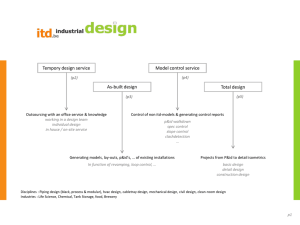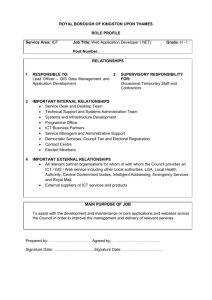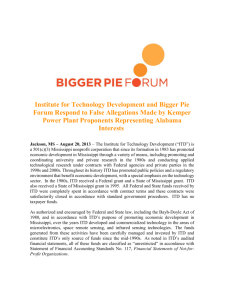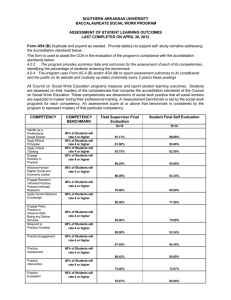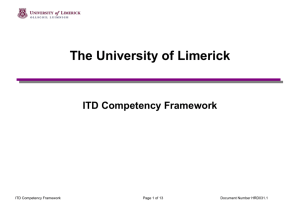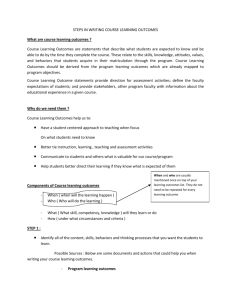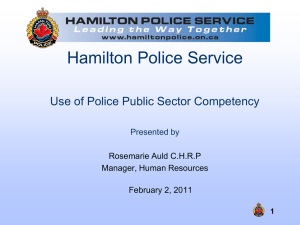ITD Introduction to Competency Framework
advertisement
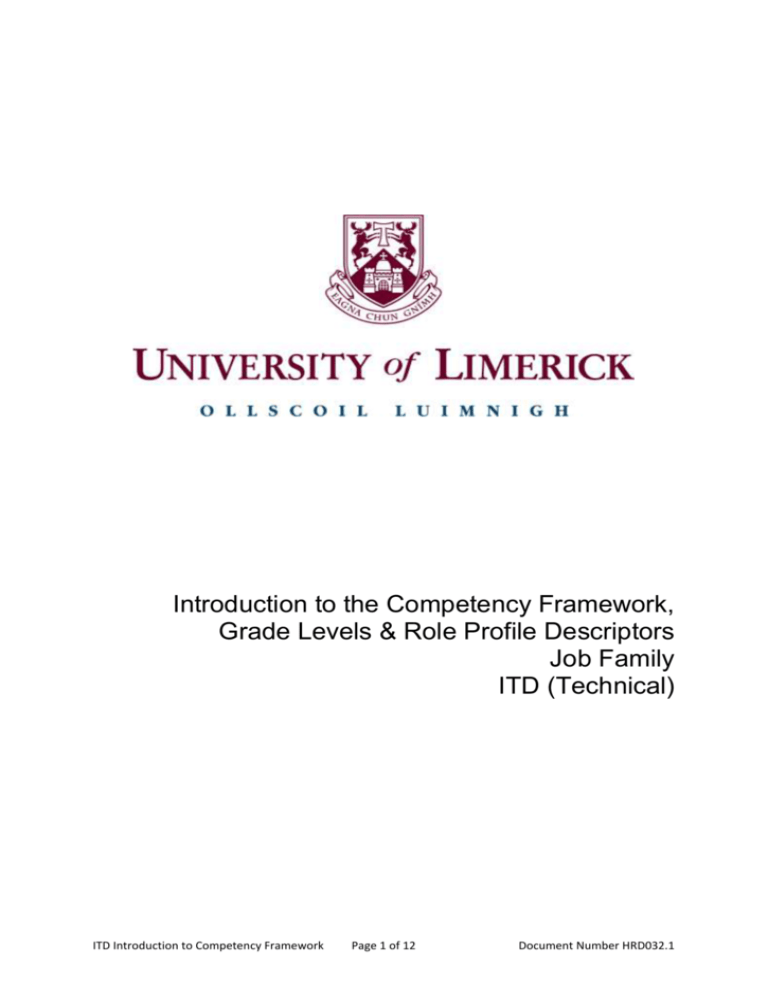
Introduction to the Competency Framework, Grade Levels & Role Profile Descriptors Job Family ITD (Technical) ITD Introduction to Competency Framework Page 1 of 12 Document Number HRD032.1 Competencies A competency is the term used to describe a cluster of related knowledge, skills, and attributes that contributes to successful job performance and, ultimately, to the goals and priorities of ITD. The identification of competencies, and the application of a competency framework, will assist in: Providing staff with clear expectations about what is required to be successful in their jobs, Providing a foundation for professional development planning, Linking with university-wide human resource practices o recruitment and selection; job evaluation; training and development; performance review and development. ITD staff display both transferable behavioural competencies such as customer focus; technical know-how such as systems or application knowledge; and knowledge of how IT operates within UL (IT Governance and strategy). It was agreed to adopt SFIA (The Skills Framework for the Information Age) as a technical skills framework for ITD and develop a supplementary behavioural competency framework, in line with ITD needs and the wider context of the Administrative Framework in UL. SFIA can be used in conjunction with other IT qualification frameworks such as ITiL. Behavioural Competencies (derived from staff consultation) The table below explains the linkage between Administrative Framework and the Final Competencies agreed for use within ITD following consultation with staff and Unions. Administrative Grade Customer Focus Planning & Organising Using Initiative, Achieving Goals Decision Making & Problem Solving Effective Communication Team & Collaborative working Effective Networking and Relationships Innovation & Creative Thinking Change, Adaptability and Flexibility Leadership Continuous Development ITD most frequently cited All (focus on projects) (includes persistence, attention to detail, delivery) (including information acquisition) (presentations, project proposals etc) All (with internal / external stakeholders / suppliers/vendors) (subset of problem solving/change) (subset of problem solving / implicit in planning and organising in relation to projects) (leading a unit/project team) (not focussed on in discussions – this was taken as read in ITD since Technology changes so rapidly ITD Introduction to Competency Framework Page 2 of 12 Agreed Competencies Customer Focus Plan & Deliver Decision Making & Problem Solving Communicate & Collaborate Managing the Relationship with the Business Change, Adaptability and Flexibility Leadership Professional Development Document Number HRD032.1 Thinking & Acting Strategically continuous learning/search for knowledge/workarounds is a necessity – less reference to development of management/people skills (At the higher level) but knowledge of ITD governance required. IT Governance Descriptions have been generated which reflect the expected behaviours of staff working within ITD Technical Competencies: Derived from SFIA Framework SFIA defines 86 professional skills that are relevant to IT Professionals in various roles. SFIA’s skills are presented in six Categories: Strategy & architecture Business change Solution development & implementation Service management Procurement & management support Client interface Roles in ITD are engaged in the provision of support services and cover a wide range of activities including: Service delivery Integrated support service for all end users (Service Desk, Service Engineering) – including AV Operations & Management of Outsourced Services Enterprise Solutions Business Solutions and Web – research, acquisition, support and integration of UL’s business system Technology Solutions Academic Solutions and Technical Architecture - research, acquisition, support and integration of systems for college use / technologies for teaching & research purposes Performance Improvement (Quality) The most relevant SFIA skill categories were agreed to be within the categories of: Service management Business change ITD Introduction to Competency Framework Page 3 of 12 Document Number HRD032.1 Grade Level and Skill Set SFIA’s skills are mapped across seven levels of responsibility and accountability. Each of the seven levels – from new entrant to strategist level – is defined in terms of autonomy, influence, complexity and business skill. It is possible to map the skills against the grade levels within ITD. ITD’s existing grading system has been mapped to SFIA’s standard levels of responsibility and accountability. Whilst the fit of grade to level may not be exact, broadly the ITD grades levels correspond, as such the framework can be used as an initial basis for an individual to describe their role and understand if the level of responsibility and accountability in their role is appropriate. Job Family ITD (Technical) SFIA Director 6/7 – Set strategy, Inspire Section Head (AP3 ) 6 – Initiate / Influence Team Leader (SEA) 5 – Ensure AP2 4 – Enable SCO/ AP1 3 – Apply CO 2 – Assist These combined with descriptions of the behavioural competencies required at each grade level provide the information needed to support: Development of generic role profiles Generic job description template Training & Development / Career framework Grade Review mechanism ITD Introduction to Competency Framework Page 4 of 12 Document Number HRD032.1 Framework Below is a schematic of the ITD framework. Note: SFIA technical skills applicable to ITD Technical Job Family only Left to right indicates increasing levels of management responsibility and job authority Left to right indicates increasing requirement for a business focus rather than technical Assist Apply Enable Ensure Influence Inspire Increasing levels of authority and complexity/work challenge Competency Technical Focus Technical & Business Focus Business Focus Customer Focus Plan & Deliver Communicate & Collaborate Problem Solving & Decision Making Managing the Relationship with the Business Change, Adaptability & Flexibility Leadership Professional Development IT Governance SFIA Assist Apply Enable Ensure Influence Business Change Service Management ITD Introduction to Competency Framework Page 5 of 12 Document Number HRD032.1 Inspire Role Profiles Role Profile This is not a job description or intended to be a replacement for individual job descriptions, nor is it an exhaustive/minimum list of requirements at a grade 1. Profiles set out the generic context and competencies required of role holders at any particular level. Different grade levels require increasing knowledge (sometimes broad, sometimes specialist) in a particular field and greater management experience. Lower level roles will be technically focussed whilst higher level roles will combine specialist technical and managerial knowledge, and will have a substantial impact on the operations and resource management within ITD. How are Role profiles used? Role profiles form the basis or a template for new job descriptions, they also provide a way for matching during job evaluation and an understanding of career progression. In job evaluation, individuals need to provide evidence of a match to the most appropriate role profile. For career progression, individuals can review the requirements of the roles above and direct their personal development / performance reviews to working towards higher grade role requirements. 1 • • Roles in the PostRoom/CLA family provide support services to University staff and students. These roles cover two main activities: support service for end users of IT, AV and print equipment provision of post and print services Note: Role profiles have yet to be generated for PostRoom & CLA’s ITD Introduction to Competency Framework Page 6 of 12 Document Number HRD032.1 COMPUTER OPERATOR GRADE SFIA Level 2 (Apply) ROLE SUMMARY Role holders will perform a range of work activities in a variety of structured environments. Role holders are expected to work under routine, but not close supervision. They may provide technical assistance, training, information and advice to customers/end users (students/staff). Assistance may be provided via service desk or as support technician on the use of computer hardware and software, including printing, installation, upgrades, word processing, electronic mail, applications, security, networking and operating systems. Typically role holders will act as the first point of contact for routine IT issues, including fault reporting and first line problem resolution, with customer service and communication responsibilities. In a support technician role they will be responsible for keeping an application or suite of applications running, performing basic or routine operational or maintenance tasks (running scripts, batch jobs etc). Roleholders will have a knowledge of and competence in their own specialism. ROLE ATTRIBUTES Autonomy Works under routine supervision. Uses minor discretion in resolving problems or enquiries Works without frequent reference to others. Influence Interacts with and may influence department. May have some external contact with customers and suppliers. May have more influence in own domain. Complexity Performs range of varied work activities in variety of structured environments. Behavioural Competencies Primary Customer Focus Plan & Deliver Professional development Communicate & Collaborate Problem Solving & Decision Making Change, Flexibility, Adaptability Qualifications/Experience SFIA level 2 demonstrated in appropriate skill category Educated to at least National Certificate (or equivalent) in computing level. Knowledge of tools and applications relevant to the role Knowledge and understanding of the policy, practices and procedures, relevant to the role Legal requirements regarding data protection and confidentiality data protection requirements. ITD Introduction to Competency Framework Page 7 of 12 Document Number HRD032.1 SENIOR COMPUTER OFFICER / ANALYST PROGRAMMER 1 GRADE ROLE SUMMARY SFIA Level 3 ‘Apply’ Role holders perform a broad range of work, sometimes complex, sometimes routine in a variety of environments. They will work under general supervision, without frequent reference to others. Depending on their specific job purpose, role holders may provide technical assistance, training, information and advice to customers/end users (students/staff), resolving more complex or escalated IT issues. They perform more complex application or maintenance tasks. They may act as a technical specialist for applications. They may be involved in design, development and implementation of IT systems and are able to analyse customer requirements. In a programmer/analyst role they will be responsible for the design, creation, testing and documentation of new or amended programmes from supplied specifications in accordance with agreed standards or under direction from senior programmer. Roleholders will have a knowledge of and competence in their specified area of IT. Appreciates the wider field of information systems, and how own role relates to other roles and to ITD or their business customer. Qualifications & Experience • SFIA level 3 demonstrated in appropriate skill category • Educated to at least Degree (or equivalent) in computing. • 2-5+ relevant years experience post degree (or 5-6 vocational) with at least 2 at level 3 • Knowledge of tools and applications relevant to the role • Knowledge and understanding of the policy, practices and procedures, relevant to the role • Legal requirements regarding data protection and confidentiality data protection requirements. Behavioural Competencies Primary Customer Focus Plan & Deliver Professional development Communicate & Collaborate Problem Solving & Decision Making Change, Flexibility, Adaptability IT Governance ITD Introduction to Competency Framework Page 8 of 12 Document Number HRD032.1 ANALYST PROGRAMMER 2 (AP2) GRADE ROLE SUMMARY SFIA Level 4 ‘Enable’ Role holders perform a broad range of complex technical or professional work activities, in a variety of contexts. Role holders work under general direction within a clear framework of accountability, they exercise substantial personal responsibility and autonomy. Roleholders may be responsible for co-ordinating the work of others or managing a small team and allocation of resources. The role holder may be the main provider of an IT service, technical support and advice in a unit or centre e.g. a college or be a senior specialist within a specific technical area e.g. application support. Dependent upon job context they may be involved in business analysis, design, development and implementation of IT systems, provision of senior specialist application support, service support of systems. In a programmer/analyst role they will be responsible for the design, creation, testing and documentation of new or amended programmes from customer / end-user supplied specifications. Roleholders will have a broad knowledge of and competence at a specialist level in one or more specified areas of IT. ROLE ATTRIBUTES Autonomy • Works under general direction within a clear framework of accountability. • Exercises substantial personal responsibility and autonomy. • Plans own work to meet given objectives and processes Influence • Influences team and specialist peers internally. • Influences customers at account level and suppliers. • Has some responsibility for the work of others and for the allocation of resources. • Participates in external activities related to own specialism. • Makes decisions which influence the success of projects and team objectives. Complexity • Performs a broad range of complex technical or professional work activities, in a variety of contexts. Qualifications & Experience • SFIA level 4 demonstrated in appropriate skill category • Educated to Degree (or equivalent) in computing level/Post-Graduate qualification in computing • 3-6+ years relevant IT experience post degree, at least 2 at level 4 (or 8-10 vocational) • Knowledge of tools and applications relevant to the role • Knowledge and understanding of the policy, practices and procedures, relevant to the role • Legal requirements regarding data protection and confidentiality data protection requirements. Behavioural Competencies Primary Customer Focus Plan & Deliver Professional development Communicate & Collaborate Problem Solving & Decision Making Change, Flexibility, Adaptability Managing the Relationship with the Business IT Governance ITD Introduction to Competency Framework Page 9 of 12 Document Number HRD032.1 TEAM MANAGER/GRADE 8/(AP3-) (SFIA LEVELS 5) ROLE SUMMARY SFIA Level 5 ‘Ensure and Advise’ CITP Level - Chartered IT Professional - carrying significant responsibility, full accountability and presenting a challenging range of complex work activities. Role holders perform a challenging range and variety of complex technical or professional work activities. They undertake work which requires the application of fundamental principles in a wide and often unpredictable range of contexts. They work under broad direction and are fully accountable for own technical work and/or project/supervisory responsibilities. Role holders at this level will take responsibility for the definition, documentation and satisfactory completion of medium-scale projects (typically lasting 12 months, with direct business impact and firm deadlines). Typically they will provide leadership to a team ensuring that team members are motivated and developing their skills and experience. Role holders are operating more strategically and are expected to have board awareness of IS and emerging opportunities, they will contribute to improvements in working practices, guidelines and standards wherever possible and ensure that they are followed consistently. Roleholders will contribute to cross-departmental and corporate projects, working groups and change programmes as required. Roleholders will have a deep knowledge of and competence at a specialist level in one or more specified areas of IT. ROLE ATTRIBUTES Autonomy • Works under broad direction • Is fully accountable for own technical work and/or project/supervisory responsibilities • Receives assignments in the form of objectives • Establishes own milestones and team objectives and delegates responsibilities • Work is often self-initiated Influence • Influences organisation, customers suppliers and peers within industry on the contribution of own specialism • Has significant responsibility for the work of others and the allocation of resources • Makes decisions which impact on the success of assigned projects ie results, deadlines and budget • Develops business relationships with customers Complexity • Performs a challenging range and variety of complex technical or professional work activities • Undertakes work which requires the application of fundamental principles in a wide and often unpredictable range of contexts. • Understands the relationship between own specialism and wider organisational requirements Qualifications & Experience • SFIA level 5 demonstrated in appropriate skill category • Educated to Degree (or equivalent) in computing level/Post-Graduate qualification in computing • 6-10+ years relevant IT experience, at least 2 at level 5 • Broad knowledge of IT, deep knowledge of specialism • Team Management Experience • Knowledge of tools and applications relevant to the role • Knowledge and understanding of the policy, practices and procedures, relevant to the role • Legal requirements regarding data protection and confidentiality data protection requirements. Behavioural Competencies ITD Introduction to Competency Framework Page 10 of 12 Document Number HRD032.1 Primary Leadership Managing the Relationship with the Business IT Governance Plan & Deliver Customer Focus Professional development Communicate & Collaborate Problem Solving & Decision Making Change, Flexibility, Adaptability ITD Introduction to Competency Framework Page 11 of 12 Document Number HRD032.1 SENIOR MANAGER UPWARDS (SFIA LEVELS 6 TO 7) ROLE SUMMARY SFIA Level 6 ‘Initiate’ Role holders at this level performs highly complex work activities covering technical, financial and quality aspects. Roleholders will contribute to the formulation of IT strategy. They have defined authority and responsibility for a significant area of work, including technical, financial and quality aspects. Roleholders establish organisational objectives and delegate responsibilities, they are accountable for actions and decisions taken by self and subordinates. ROLE ATTRIBUTES Autonomy • Has defined authority and responsibility for a significant area of work, including technical, financial and quality aspects. • Establishes organisational objectives and delegates responsibilities. • Is accountable for actions and decisions taken by self and subordinates. Influence • Influences policy formation on the contribution of own specialism to business objectives. • Influences a significant part of own organisation and influences customers/suppliers and industry at senior management level. • Makes decisions which impact the work of employing organisations, achievement of organisational objectives and financial performance. • Develops high-level relationships with customers, suppliers and industry leaders. Complexity • Performs highly complex work activities covering technical, financial and quality aspects. • Contributes to the formulation of IT strategy. • Creatively applies a wide range of technical and/or management principles. Qualifications & Experience • SFIA level 6 demonstrated in appropriate skill category • Educated to Degree (or equivalent) in computing level/Post-Graduate qualification in computing • 10-12+ years relevant IT experience • Team Management Experience • Knowledge of tools and applications relevant to the role • Knowledge and understanding of the policy, practices and procedures, relevant to the role • Legal requirements regarding data protection and confidentiality data protection requirements. Behavioural Competencies Primary Leadership Managing the Relationship with the Business IT Governance Plan & Deliver Customer Focus Professional development Communicate & Collaborate Problem Solving & Decision Making Change, Flexibility, Adaptability ITD Introduction to Competency Framework Page 12 of 12 Document Number HRD032.1
